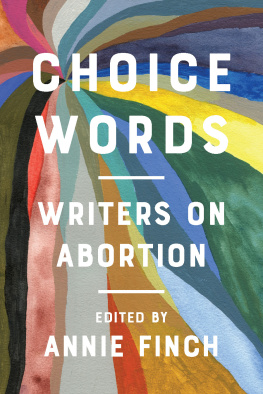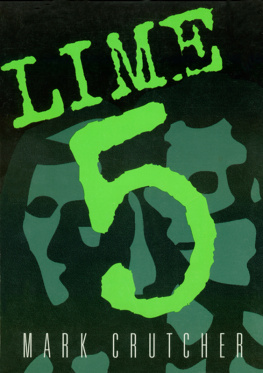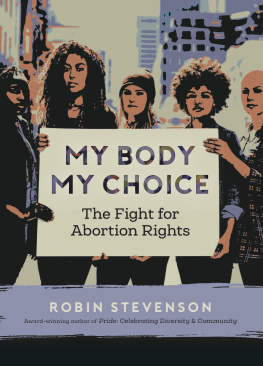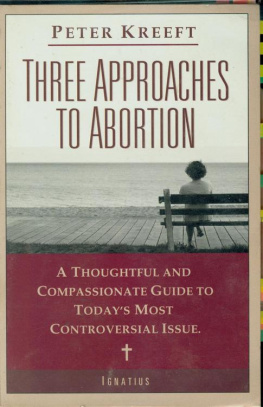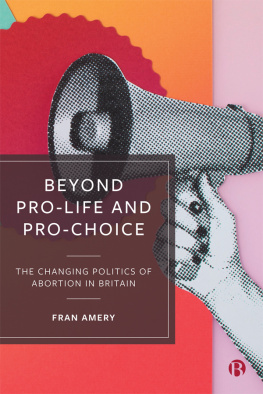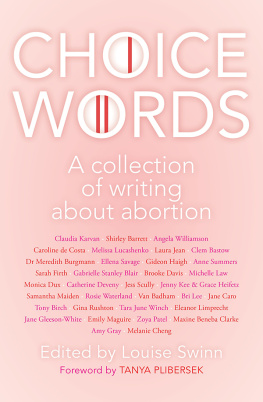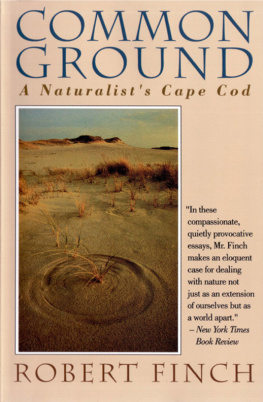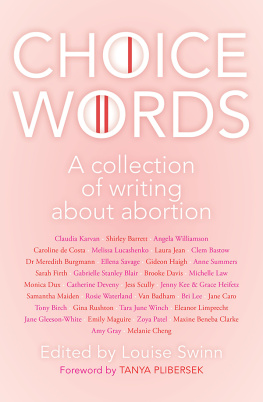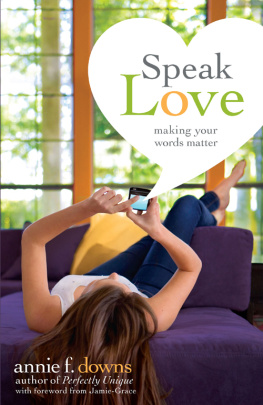Annie Finch - Choice Words: Writers on Abortion
Here you can read online Annie Finch - Choice Words: Writers on Abortion full text of the book (entire story) in english for free. Download pdf and epub, get meaning, cover and reviews about this ebook. year: 2020, publisher: Haymarket Books, genre: Science fiction. Description of the work, (preface) as well as reviews are available. Best literature library LitArk.com created for fans of good reading and offers a wide selection of genres:
Romance novel
Science fiction
Adventure
Detective
Science
History
Home and family
Prose
Art
Politics
Computer
Non-fiction
Religion
Business
Children
Humor
Choose a favorite category and find really read worthwhile books. Enjoy immersion in the world of imagination, feel the emotions of the characters or learn something new for yourself, make an fascinating discovery.
- Book:Choice Words: Writers on Abortion
- Author:
- Publisher:Haymarket Books
- Genre:
- Year:2020
- Rating:3 / 5
- Favourites:Add to favourites
- Your mark:
- 60
- 1
- 2
- 3
- 4
- 5
Choice Words: Writers on Abortion: summary, description and annotation
We offer to read an annotation, description, summary or preface (depends on what the author of the book "Choice Words: Writers on Abortion" wrote himself). If you haven't found the necessary information about the book — write in the comments, we will try to find it.
Choice Words: Writers on Abortion — read online for free the complete book (whole text) full work
Below is the text of the book, divided by pages. System saving the place of the last page read, allows you to conveniently read the book "Choice Words: Writers on Abortion" online for free, without having to search again every time where you left off. Put a bookmark, and you can go to the page where you finished reading at any time.
Font size:
Interval:
Bookmark:

CHOICE WORDS

2020 Annie Finch
Published in 2020 by
Haymarket Books
P.O. Box 180165
Chicago, IL 60618
773-583-7884
www.haymarketbooks.org
ISBN: 978-1-64259-200-9
Distributed to the trade in the US through Consortium Book Sales and Distribution (www.cbsd.com) and internationally through Ingram Publisher Services International (www.ingramcontent.com).
This book was published with the generous support of Lannan Foundation and Wallace Action Fund.
Special discounts are available for bulk purchases by organizations and institutions. Please email for more information.
Cover design by Abby Weintraub.
Library of Congress Cataloging-in-Publication data is available.
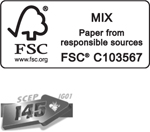
For my sister
Mary Dabney Baker Finch (19522018)
with sorrow that your
secret youthful abortion
wounded you and
many others
FOREWORD
Katha Pollitt
Women have been ending pregnancies for thousands of years, but its hard to think of many classic poems or stories in which abortion makes an appearance, and most of what exists was written by men who disapproved of it. Think of T. S. Eliots The Waste Land, in which working-class women in a pub gossip crudely about a friend who took pills to bring it off, or Hemingways Hills Like White Elephants, in which an aimless expatriate tries to persuade his sweet, passive girlfriend into an abortion she clearly doesnt want. With few exceptions, abortion figures in mens writings as a symbolof modern alienation, of a larger sterility.
It took women writers to give the subject both bloody realism and emotional and social complexity. Even before the womens liberation movement of the 1960s and 1970s, women wrote about abortion as simultaneously a personal experience and something more general: a necessary form of self-defense against poverty, stigma, exhaustion, crushing social expectations, ones own sheer fertility, and brutal men.
The experience of abortion is something millions of women share, but there is no universal abortion experience, because every woman is different. Nearly every kind of abortion you can imagine is represented here. Abortions legal and illegal, safe and dangerous, and fatal; abortions despite the wishes of others and abortions at the behestthe compulsionof others; abortion as a claiming of self and abortion as an abnegation of self. There is abortion as tragedy, and also abortion as an occasion for wry comedy, as in Vi Khi Naos An Avocado Is Going to Have an Abortion:
An avocado is going to have an abortion. What is the grapefruit going to do about it? It hasnt gotten it pregnant. Certainly not.
In First Response, Desiree Cooper captures the multiplicity of abortion, and also its ubiquity:
Joyce didnt have sex until she was married eight years later. Trish went back to work like nothing ever happened. We made a donation every anniversary. We were pregnant with memory for the rest of our lives. We never thought about it again.
In the popular imagination, abortion is the rejection of motherhoodwomen who have abortions are coldhearted career women, child-haters, feckless sluts. In real life, the majorityabout 60 percentof American women who have abortions are already mothers. Its not surprising, but it is important, that in these pages we find abortion most often placed in the context of motherhood, especially for Black writers. Georgia Douglas Johnsons abortion poem is Motherhood; Gwendolyn Brookss is called the mother. In the lost baby poem, Lucille Clifton writes:
if i am ever less than a mountain
for your definite brothers and sisters
let the rivers pour over my head
There is one kind of abortion you wont find here, though, and that is the mythical one of anti-abortion propaganda: the frivolous abortion for no good reason, the abortion of sluttish, worthless women who just cant be bothered, the abortion for convenience. As Marge Piercy writes in her poem brilliantly titled Right to Life,
I am not your cornfield,
not your uranium mine, not your calf
for fattening, not your cow for milking.
You may not use me as your factory.
Priests and legislators do not hold
shares in my womb or my mind.
This is my body. If I give it to you
I want it back. My life
is a nonnegotiable demand.
Abortion is always serious. As serious as birth.
INTRODUCTION
Annie Finch
I had an abortion in 1999. Searching for literature to help me absorb my experience, I realized that I had rarely read anything about abortion (and I have a PhD in literature). I was astounded to discover that there was no major literary anthology about one of the most profound experiences in my life and that of millions of others. A physical, psychological, moral, spiritual, political, and cultural reality that navigates questions of life and death, abortion should be one of the great themes of literature.
Choice Words is the result of the twenty-year search that grew out of this initial sense of shock and loss. As I put out calls for poetry, novels, short stories, and drama and reached out to writers and scholars for recommendations and leads, I discovered that major writers had indeed written about the subject, but that much of the literature was hard to find, unpublished, or buried within larger literary works. The project was dispiriting at times, and I had nearly given up when a traumatic presidential election and an enraging Supreme Court appointment renewed my energy to complete the book.
Over the years, the anthology grew to encompass lyric and narrative poems, plays, short stories, tweets, memoirs, flash fiction, rituals, journals, and excerpts from novels. Here are writings that invoke grief, defiance, fear, shame, desperation, love, awe, tenderness, sorrow, regret, compassion, hope, despair, resolve, rage, triumph, relief, and peace. Here are writers from the sixteenth through twenty-first centuries, across ethnicities, cultures, genders and sexualities, including U.S. writers of diverse backgrounds and voices from Bulgaria, China, England, Finland, India, Iran, Ireland, Kenya, Northern Ireland, Pakistan, Romania, Saudi Arabia, Scotland, South Africa, Sudan, and Syria, sharing how class, patriarchy, race and ethnicity, wealth, poverty, and faith traditions impact our understanding and experience of abortion.
Choice Words includes courageous, iconic texts that speak out ahead of their time, such as Blandianas The Childrens Crusade; Brookss the mother; Cliftons Lost Baby Poem; Lambs What Have You Done for Me Lately?; Piercys Right to Life; Salehs A Million Women Are Your Mother; and Wollstonecrafts Maria: or, The Wrongs of Woman. Some of the pieces included are moving first-person accounts ranging from contemporary high schoolers in Pakistan to feminist legends such as Audre Lorde and Gloria Steinem. Others express the imaginative literary vision of major writers such as Margaret Atwood, Ruth Prawer Jhabvala, Ursula LeGuin, Gloria Naylor, Joyce Carol Oates, Anne Sexton, Ntozake Shange, Leslie Marmon Silko, Edith Sdergran, Amy Tan, Mo Yan, and so many more.
The powerful literary writing in Choice Words depicts the collective courage of our struggle to gain back reproductive freedom and make clear that bodily autonomy is necessary to human freedom and integrity. They describe the tragic emotional and physical toll of cultural, political, and religious attempts to force us to have children, to force us to have abortions, or to surround our reproductive choices with shame, silence, and isolation. These are the words we need to learn from now.
Font size:
Interval:
Bookmark:
Similar books «Choice Words: Writers on Abortion»
Look at similar books to Choice Words: Writers on Abortion. We have selected literature similar in name and meaning in the hope of providing readers with more options to find new, interesting, not yet read works.
Discussion, reviews of the book Choice Words: Writers on Abortion and just readers' own opinions. Leave your comments, write what you think about the work, its meaning or the main characters. Specify what exactly you liked and what you didn't like, and why you think so.

